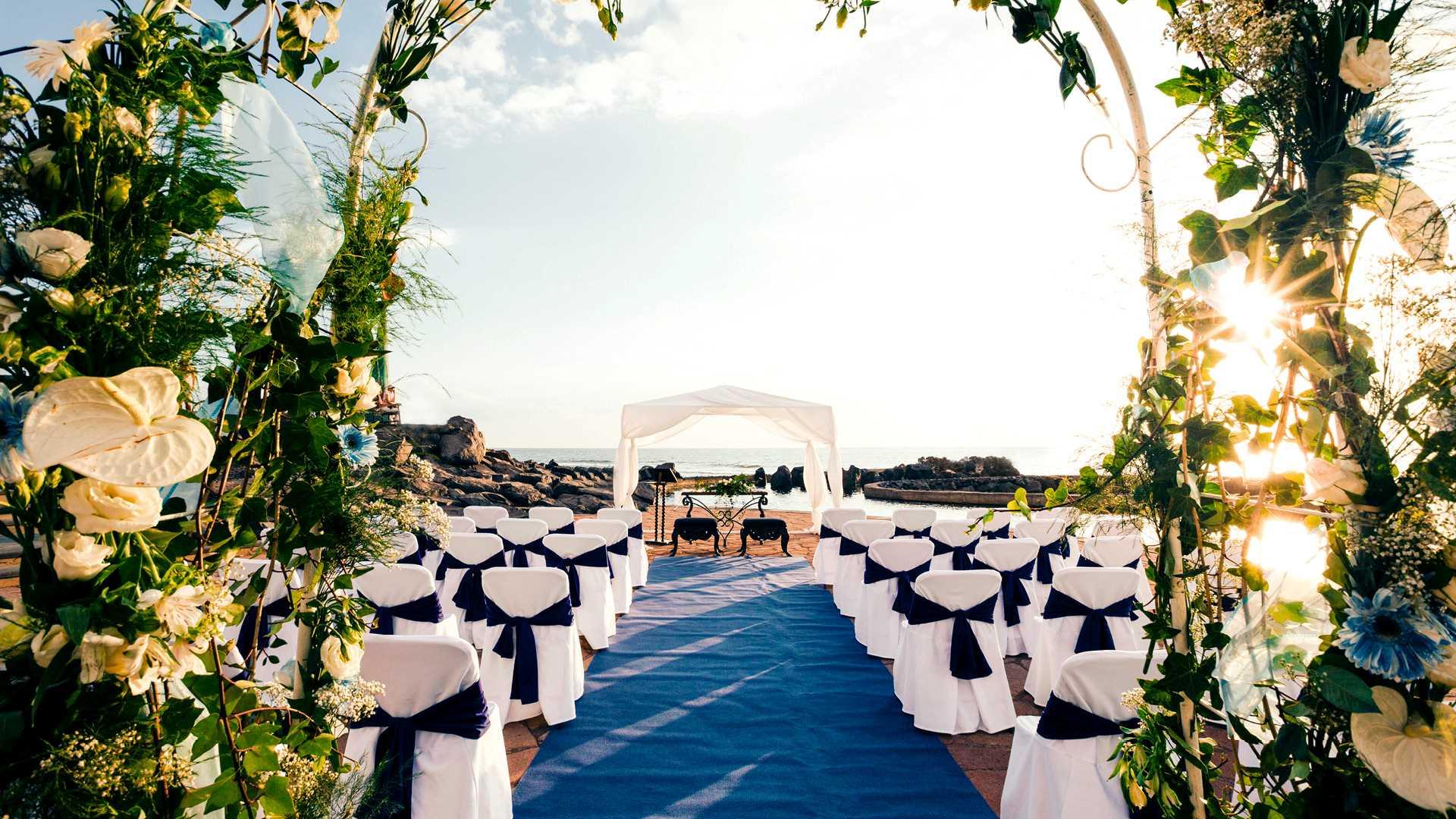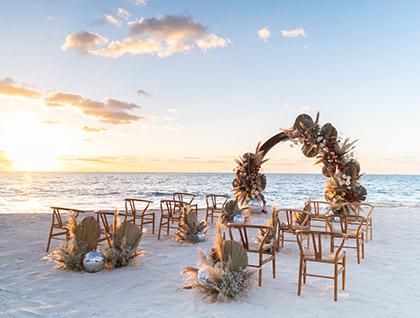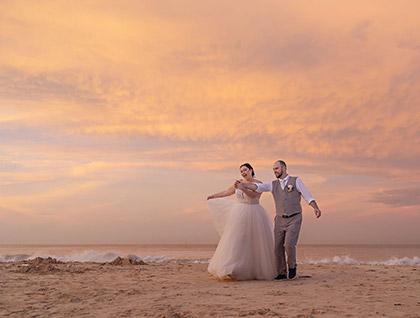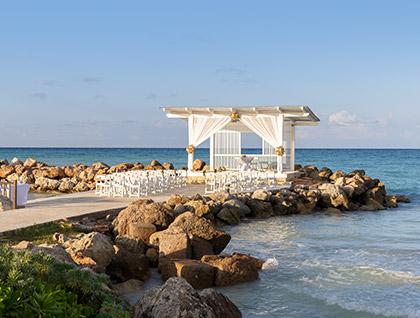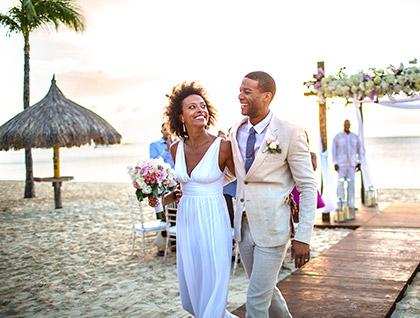9 Destination Wedding Etiquette Questions, Answered
LT Globetrotter
Planning a destination wedding is not all that different from planning a wedding at home—both require couples to make decisions about venues, officiants, and cake flavors, among other details. But of course, getting married internationally comes with its own set of logistical challenges.
Does your guest list have to be large? Should you offer to pay for your cousin’s accommodations? Are you allowed to ask for gifts?
To help you get through the planning process unscathed (now’s not the time to risk offending your family and friends), we’ve answered some of the most common destination wedding etiquette questions. Read on for our best advice.
Contents
Where Should We Host a Destination Wedding?
How Many People Should We Invite?
Do We Have to Invite Kids and Plus-Ones?
How Long Should We Invite Guests Stay at the Resort?
When Do We Need to Send Invitations?
What Info Needs to Be on Our Wedding Website?
Should We Pay for Guests’ Flights and Hotels?
What Excursions and Events Do We Need to Plan?
Should We Create a Gift Registry?
Where Should We Host a Destination Wedding?
Technically speaking, you can have a destination wedding anywhere in the world. But just because you can journey 5,000+ miles from home, doesn’t mean you should.
As a general rule, try to make travel as simple as possible for your guests—for instance, by avoiding locations that require people to book multiple connecting flights. To ensure your friends and family can attend and feel comfortable at your wedding, you should also:
- Pick a date outside of peak travel times (prices skyrocket during spring break)
- Be wary of weather patterns and events—traveling in hurricane season can be difficult
- Understand local attitudes toward religion, gender, and sexuality
- Research if the countries and resorts you’re interested in are accessible
While you may not be able to accommodate every guest, your relatives, bridal party, and other invitees will appreciate the effort you put into inquiring about their needs.
How Many People Should We Invite?
Like a traditional wedding, this depends on your personal preference and budget—there’s no magic number we can give you. So, rather than worry about the quantity of your guests, think about the quality of your guests.
Before finalizing any destination wedding plans, check in with the people who are most important to you. If you can’t imagine getting married without your mom, brother, or college roommate in attendance, ask whether they’re willing to travel for your big day and if they can afford the trip. Ideally, all your VIP guests will be excited by the prospect of you getting married in a destination like Mexico, Jamaica, Aruba, or the Dominican Republic.

Do We Have to Invite Kids and Plus-Ones?
Again, this is entirely up to you. If you’ve always envisioned an adults-only affair, then that’s what you should plan for. Just make sure this is clearly communicated to guests as early as possible so that they can arrange childcare.
The number of plus-ones you allow can largely be determined by your budget. But keep in mind that it’s customary to let married, engaged, and cohabitating individuals—as well as those in the wedding party—bring a date.
According to destination wedding etiquette, you should also extend a plus-one to people who don’t know your family or friends very well; these guests will appreciate having someone to spend time with during the reception and throughout the duration of their stay.
How Long Should We Invite Guests Stay at the Resort?
This is somewhat out of your control, as some people will be limited by work schedules and other commitments. However, in order to take advantage of group room rates, it’s common for guests to stay at least three to four nights.* This allows everyone to truly enjoy the destination and take part in other activities (more on this below).

When Do We Need to Send Invitations?
Invitations are typically delivered four to five months before couples say “I do.” But this needs to happen much earlier if you’re planning a destination wedding—think 12 to 15 months in advance. This allows you to:
- Collect RSVPs before paying a deposit for your hotel room block
- Renew your passports, IDs, and other travel documents
In addition, it gives you and your guests ample time to request vacation days, arrange accommodations for children and pets, and book flights and other transportation.
What Info Needs to Be on Our Wedding Website?
The more information you can share with guests, the better.
When you plan a destination wedding with Liberty Travel, you’ll receive a free website that people can use to view itineraries, book flights and hotels, and communicate with a consultant. Our experts can also help you send group messages to all invitees so you can easily share dress codes and packing recommendations, maps and directions, your preferred wedding hashtags, and other details.
Should We Pay for Guests’ Flights and Hotels?
No guest should expect you to pay for their airfare or accommodations, but you can certainly choose to do so. Perhaps, instead of footing the bill for your wedding party’s attire, you cover the cost of their flights. Or maybe, if there’s some wiggle room in your budget, you could help pay for someone that otherwise can’t afford to travel.
Your Liberty Travel consultant can help you make special arrangements or handle multiple payments, so do what feels right based on your guests’ unique situations. That said, you should let it be known upfront (say, on your invitations and wedding website) that people will be required to pay their own way.

What Excursions and Events Do We Need to Plan?
Rather than paying for everyone’s flights and hotels, book excursions to show your appreciation for guests. Since you’re all traveling such a long way, you might as well do some sightseeing.
Plus, it’s a great way for your friends and family to get acquainted before the wedding day. Your travel consultant can help organize welcome brunches, rehearsal dinners, and cocktail hours at your resort, too.
However, try not to plan too many group activities. The fact that you get a built-in vacation is one of the top reasons to have a destination wedding, and it’s likely your guests will also want to make the most of the trip—so don’t have every single second of every single day scheduled. Let them relax by the pool and explore the local area on their own time.
Should We Create a Gift Registry?
Most couples will choose not to register for gifts, given how much attendees need to spend on travel. Simply include a line on your invitations and wedding website that lets your guests know their presence is more than enough.
Have gift ideas in mind anyway, though! There will always be guests who insist on giving you something despite your objections. And it’s likely people who can’t attend will want to celebrate your marriage through the gifting of homewares, champagne, and other items.
While there are certainly extra decisions to navigate, planning a destination wedding boils down to one thing: creating a celebration that reflects you and your partner’s personalities and relationship. If you’re ready to bring your vision to life, get in touch. Liberty Travel’s expert consultants can help you with everything from choosing resorts and securing group rates to coordinating with vendors and booking flights.*
Please note: Travel requirements and health standards are continually changing. Visit our Traveler Resources Hub for important updates and to learn more about the entry rules of your specific destination.
*Conditions apply. Group rates and offers vary based on participating partners and minimum guests/passengers.
